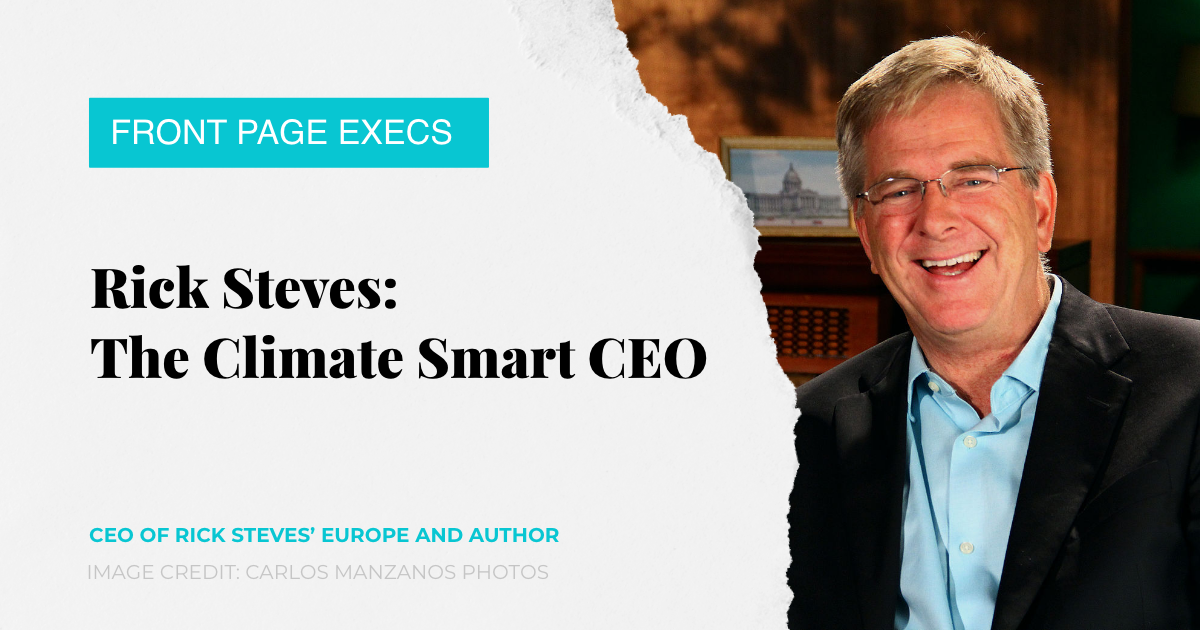Climate change is an important topic and it is no surprise that many are looking to leaders and businesses to act, given that large businesses have a sizable impact on the environment. In 2017, a report by the Carbon Disclosure Project found that just 100 companies are responsible for 71% of global greenhouse gas emissions. Of course, the type of industry can also affect the company’s carbon footprint. Last year, a study showed that 8% of global greenhouse gas emissions were related to the tourism industry, and this percentage is expected to grow at an annual rate of 4%. While these statistics may be staggering, some leaders are taking action. Rick Steves, the CEO of Rick Steves’ Europe, recently announced his plans to donate an annual amount of $1 million on Twitter.
The Self-Imposed Carbon Tax
Our tour company takes 30,000 people to Europe every year.
We think we should pay for the impact all those flights have on our environment — and until our government requires us to do so, we’re doing so voluntarily: https://t.co/KbNijPRaNT pic.twitter.com/kFxMqlr6Ge
— Rick Steves (@RickSteves) October 2, 2019
He calls it a “self-imposed carbon tax” that is meant to offset the carbon emissions produced from his company’s operations, namely the tours in Europe. To come up with this amount, Steves used the suggested amount to offset carbon emissions for those travelling to Europe from the US, which is $30. His company provides tours for approximately 30,000 Americans each year, totalling $900,000 (which he then rounded up).
Despite already bolstering his company’s brand image of being an eco-friendly and progressive choice for U.S. travellers, he further stated the $1 million amount itself is not a static annual amount either. Steves promises the total donation will grow as the business does, making it a proportional “tax” based on the number of travellers that use his company’s touring services.
The money will be donated to 11 organizations, including Bread For The World, ELCA Lutherans, and Citizens Climate Lobby, all of which drive to his company’s climate-smart goals: campaigning Congress for the US government to take stronger action on climate change, and assisting farming communities in developing nations to enable eco-friendly methods in the agriculture and forestry industries.
Food 4 Farmers has received a $50,000 grant from Rick Steves' Europe to address food insecurity in Latin America’s rural communities by transforming small-scale coffee farms into diversified, environmentally sustainable agricultural hubs. https://t.co/qHEpTKcfWx @food4farmers pic.twitter.com/wC354yILNJ
— Roast Magazine (@RoastMagazine) October 11, 2019
Positioning the Brand as an Eco-Friendly Option
Producing or switching over to environmentally friendly products has caught on in many other industries, especially in the food industry, where businesses are adopting paper over plastic straws, or halting the usage of plastic bags altogether among other initiatives. However, such changes are harder to implement within the tourism industry where consumers are getting an experience rather than a physical product.
In a survey of 6,000 Western travellers, one in five said they flew less often after feeling the pressure of “flight shaming.” However, in Steves’s opinion, flying or travelling less or stopping altogether is not the right option. “To simply stop traveling would be the wrong solution. Travel is not only a great form of recreation, but also an important opportunity to broaden our perspectives and humanize the world by experiencing different culture.” Steves has found a great compromise between taking action while not condemning his own industry.
Steves’s actions are not just benefiting the environment, but the Rick Steves’ Europe brand as well. This announcement positions his travel company as one of the few eco-friendly options within the tourism industry—one that takes an ethical stand on climate change by being transparent with acknowledging its own impact and being proactive about solving that impact. It will attract consumers who want to travel with peace of mind.
When it comes to climate change, ethical travel companies need to pay their carbon bill — and that’s why Rick Steves' Europe has committed to a self-imposed carbon tax.
We're donating $1 million of our profits every year.
Learn more via @CBSNews: https://t.co/1RiaJSHaYD
— Rick Steves (@RickSteves) October 9, 2019
As mentioned earlier, the company’s two climate-smart goals targets two different yet related causes: climate change and helping farmers in the developing world. This means not only is the company seen as an eco-friendly choice, but one that is focused on social good as well.
Rick Steves: the Climate-Smart CEO
Marc Benioff, founder of Salesforce, wrote an op-ed for The New York Times titled, “We Need a New Capitalism.” He writes, “Every C.E.O. and every company must recognize that their responsibilities do not stop at the edge of the corporate campus. When we finally start focusing on stakeholder value as well as shareholder value, our companies will be more successful, our communities will be more equal, our societies will be more just and our planet will be healthier.” However, some remain skeptical of big businesses’ ability or willingness to take action.
https://twitter.com/AnandWrites/status/1183743928371015686
This highlights how notable Steves’s action is. Not only does he believe businesses should and can do better, but he is taking initiative by “taxing” his company voluntarily. His actions also show that he is in touch with major issues and understands the role his company has on the environment. Steves is taking initiative and setting an example for other CEOs and leaders.
In his interview with QZ, Steve states, “As a wealthy business owner in a wealthy country, I wanted to both address climate change and help the developing world. Rather than buy carbon offsets (which is a fine thing to do), with this program, I get to enjoy a kind of philanthropic twofer by helping farmers in the developing world have better lives while employing climate-smart agriculture and forestry techniques.”
This demonstrates that Steves is not just as a proactive leader who wants to make a meaningful change in the world, but also that he is a transparent, authentic individual who understands he is in a position of privilege. He is using his position and Twitter in particular to highlight causes that are important to him.
Conclusion
While it would have been nice for Steves to attach a company or initiative-specific hashtag to his tweet to generate more engagement, his story has been picked up by many publications, such as Business Insider and CBS News. His tweet has generated over 900 likes and almost 200 retweets so far, which is far more than his other recent posts leading up to that announcement. His previous three posts generated 286 likes, 26 reweets; 21 likes, 7 retweets; and 147 likes, 26 retweets respectively.
In MediaPosts’ opinion piece, Is There Still Room In Today’s Marketing World For Rick Steves?, author Gord Hotchkiss discusses Rick Steves and his brand image, stating “This is no “flash-in-the pan” brand bite crafted for a social share. This is a mission statement backed by over 40 years of consistent delivery to its ideals. It’s like Steves himself: earnest, sincere, thoughtful and just a little bit dorky.”
Throughout his career as an author, TV personality, and business owner, Steves has built the persona of being a wholesome CEO, one who is genuinely engaged and interested in making positive changes. In a profile of Steves in The New York Times, author Sam Anderson describes Steves as “one of the legendary PBS superdorks — right there in the pantheon with Mr. Rogers, Bob Ross and Big Bird. Like them, Steves is a gentle soul who wants to help you feel at home in the world.”
The world is a better place because you were in it, Rick. This is a wonderful idea and complements the beauty of traveling
— Ari K. Bais (@TheTradingRay) October 2, 2019
The voluntary implementation of a carbon tax on his company was met with praise from both the general public and government officials alike. Steves’ actions have caught the attention of notable individuals, such as Jay Inslee, the governor of Washington.
Rick Steves' Europe is investing $1 million annually to empower nonprofits fighting climate change. That’s incredible, and I’d expect no less from a guy like Rick.
Learn more about their Climate Smart Commitment. https://t.co/vWjIoB0Nee
— Jay Inslee (@JayInslee) October 2, 2019
By taking initiative and implementing a carbon tax on his own company, Rick Steves has shown that CEOs can help lead the way on important global and social issues. The steps he is taking to offset carbon emissions is not just beneficial to the earth, but strengthens his company’s brand image as leaders in the fight against climate change.


